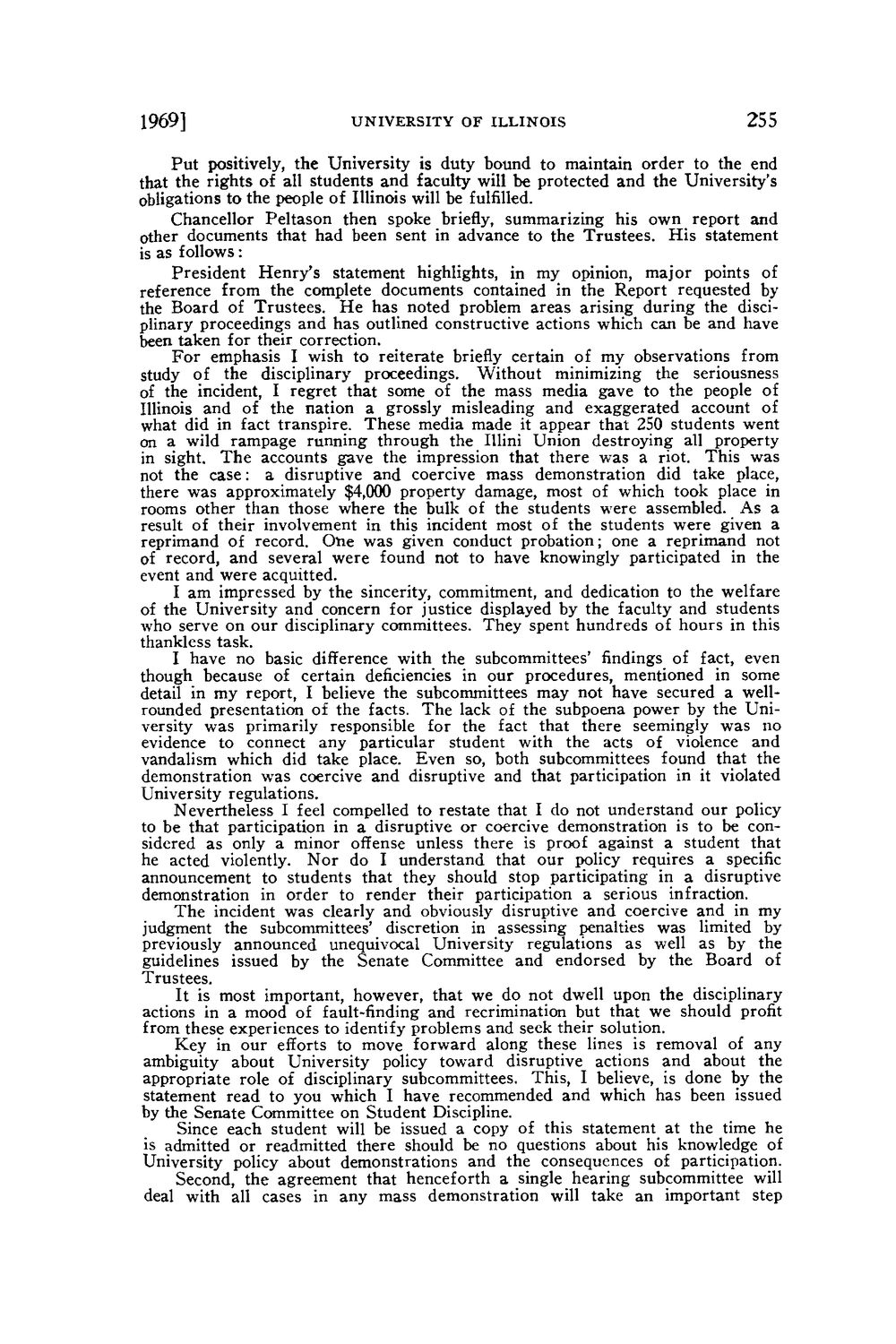| |
| |
Caption: Board of Trustees Minutes - 1970
This is a reduced-resolution page image for fast online browsing.

EXTRACTED TEXT FROM PAGE:
1969] UNIVERSITY OF ILLINOIS 255 Put positively, the University is duty bound to maintain order to the end that the rights of all students and faculty will be protected and the University's obligations to the people of Illinois will be fulfilled. Chancellor Peltason then spoke briefly, summarizing his own report and other documents that had been sent in advance to the Trustees. His statement is as follows: President Henry's statement highlights, in my opinion, major points of reference from the complete documents contained in the Report requested by the Board of Trustees. H e has noted problem areas arising during the disciplinary proceedings and has outlined constructive actions which can be and have been taken for their correction. For emphasis I wish to reiterate briefly certain of my observations from study of the disciplinary proceedings. Without minimizing the seriousness of the incident, I regret that some of the mass media gave to the people of Illinois and of the nation a grossly misleading and exaggerated account of what did in fact transpire. These media made it appear that 250 students went on a wild rampage running through the Illini Union destroying all property in sight. T h e accounts gave the impression that there was a riot. This was not the case: a disruptive and coercive mass demonstration did take place, there was approximately $4,000 property damage, most of which took place in rooms other than those where the bulk of the students were assembled. As a result of their involvement in this incident most of the students were given a reprimand of record. One was given conduct probation; one a reprimand not of record, and several were found not to have knowingly participated in the event and were acquitted. I am impressed by the sincerity, commitment, and dedication to the welfare of the University and concern for justice displayed by the faculty and students who serve on our disciplinary committees. They spent hundreds of hours in this thankless task. I have no basic difference with the subcommittees' findings of fact, even though because of certain deficiencies in our procedures, mentioned in some detail in my report, I believe the subcommittees may not have secured a wellrounded presentation of the facts. The lack of the subpoena power by the University was primarily responsible for the fact that there seemingly was no evidence to connect any particular student with the acts of violence and vandalism which did take place. Even so, both subcommittees found that the demonstration was coercive and disruptive and that participation in it violated University regulations. Nevertheless I feel compelled to restate that I do not understand our policy to be that participation in a disruptive or coercive demonstration is to be considered as only a minor offense unless there is proof against a student that he acted violently. Nor do I understand that our policy requires a specific announcement to students that they should stop participating in a disruptive demonstration in order to render their participation a serious infraction. T h e incident was clearly and obviously disruptive and coercive and in my judgment the subcommittees' discretion in assessing penalties was limited by previously announced unequivocal University regulations as well as by the guidelines issued by the Senate Committee and endorsed by the Board of Trustees. It is most important, however, that we do not dwell upon the disciplinary actions in a mood of fault-finding and recrimination but that we should profit from these experiences to identify problems and seek their solution. Key in our efforts to move forward along these lines is removal of any ambiguity about University policy toward disruptive actions and about the appropriate role of disciplinary subcommittees. This, I believe, is done by the statement read to you which I have recommended and which has been issued by the Senate Committee on Student Discipline. Since each student will be issued a copy of this statement at the time he is admitted or readmitted there should be no questions about his knowledge of University policy about demonstrations and the consequences of participation. Second, the agreement that henceforth a single hearing subcommittee will deal with all cases in any mass demonstration will take an important step
| |